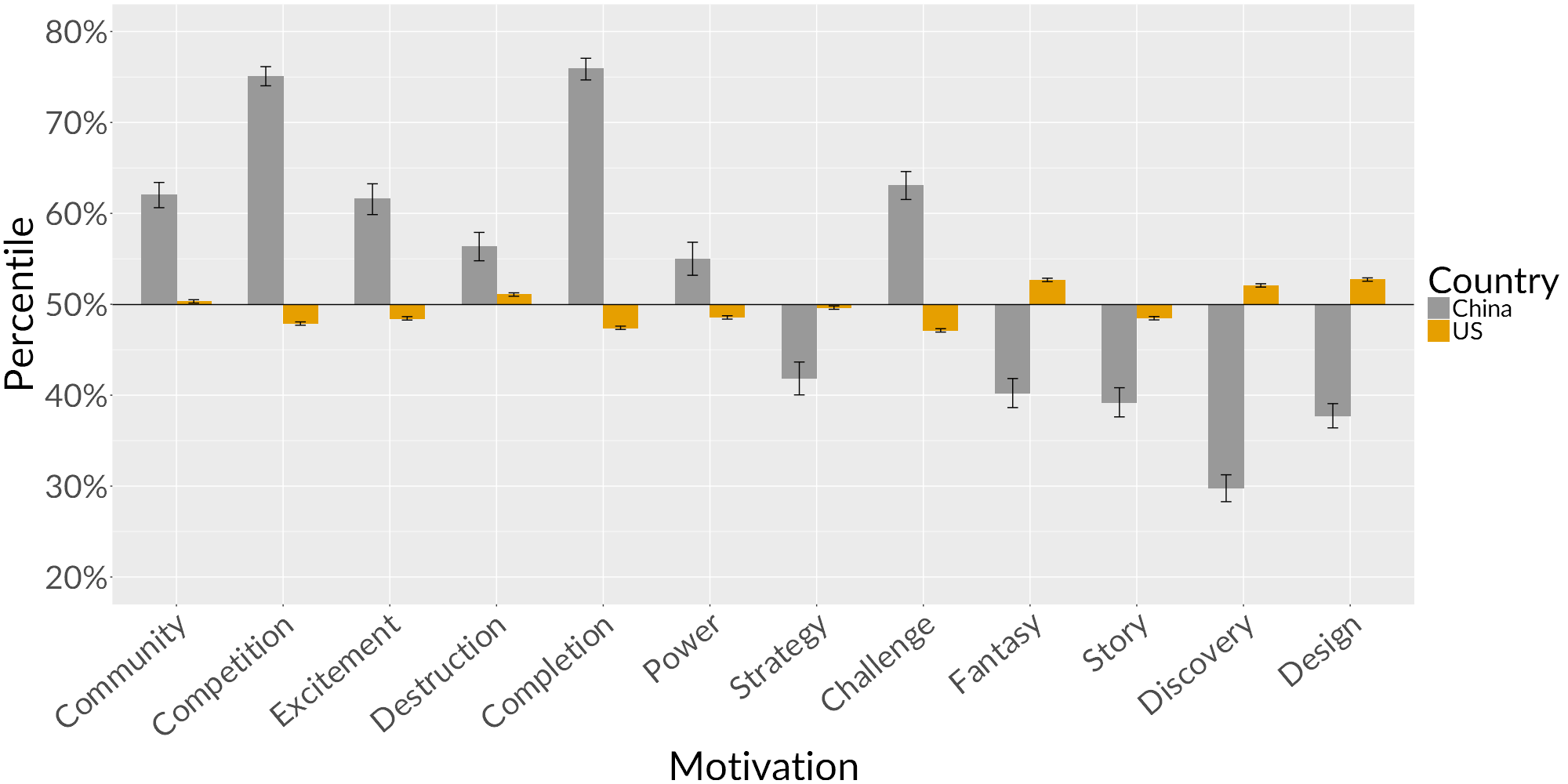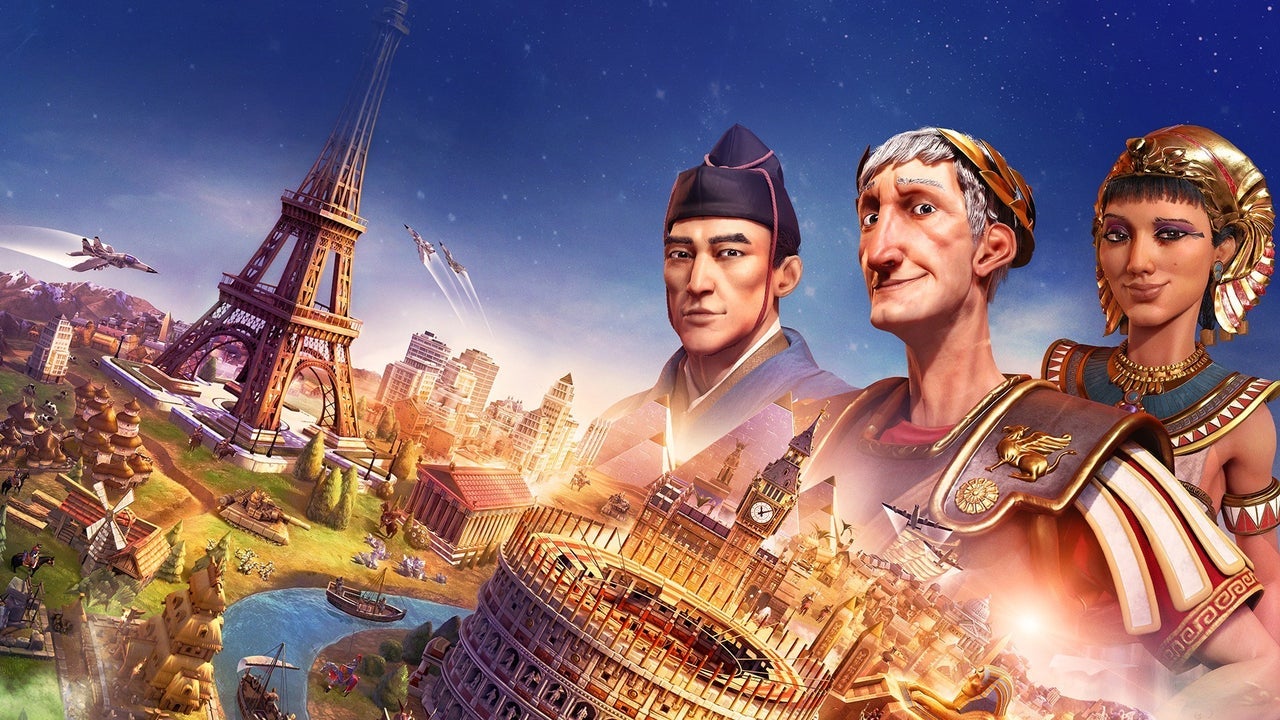“Another potential hypothesis is that the increasing negativity, polarization, intrusiveness, and emotional manipulation in social media has created a persistent cognitive overload on the finite cognitive resources we have,” Quantic Foundry said. “Put simply, we may be too worn out by social media to think deeply about things.”
in other words, we’re burnt out and we just want some escapism …
It’s not just that. Many games these days are so detailed, it’s like having a second job that you don’t get paid to do, but instead pay them to be “allowed” to do. No thank you.
Many games these days are so incomplete
throw in having to pay to beta test on top of all the other headaches …
The WoW model.
World of Warcraft is more, I think, that it imposes specific time constraints than that it’s deeply complex.
They have a different category than “Strategy” for “Community” that I’d think would capture something like World of Warcraft.
Right I was mostly referring to the whole “the game is your job and you pay to do it” aspect.
Are gamers getting older? It would be interesting to see how this breaks down by age.
I’m getting older. I have 3 kids and no time. 10 years ago I had no kids and 3 time. Now when I play, I just put it on the easiest setting and play it like an interactive movie.
The article says that they couldn’t find subgroups to show trends, so seems to be pretty flat across the board
Ah yeah though not directly mentioned, I guess it does imply that.
My favourite journalistic practice is when outlets lump up everyone playing video games into a single group called “gamers.”
Clearly this study is the result of including mobile gamers in with other groups.
Stares at most PDX games having increasing player counts
How much of this is the lack of people wanting to play strategy games vs the lack of good strategy games
exactly what i was going to ask. Uh, when was the last good strategy game? Looking at my steam library…
I have 2000+ hours in factory games, Factorio, Satisfactory, Dyson Sphere… not really strategy but those are solid thought based games released <10 years ago
Then… Age of Empires 4? Civ 6? Both pale in comparison to their predecessors. Cities Skylines 1… but then there’s the whole thing about 2. Star Trek Infinite was a flop and from what I read was just a horrible bland game. Serious, what has come out by big studios in the last 5 years in terms of strategy? I see more flashy graphics than strategy in these recent games.
Victoria 3 is the only one I can think of, but the reception is lack luster. Maybe I’ll pick it up I’m 5 DLCs
I really like Victoria 3, it has its issues but I don’t mind them that much. I find much of the criticism is from ppl. who played Victoria 2.
In terms of other new games there is humankind which is similar to the Civ series. It has some great new concepts but some weirdness that I for unknown reasons can’t move past.
thanks for the tip, i’ll look into this
Exactly! I absolutely love EU4 and am excited about the likely next installment. Unfortunately, I’m less excited about their other recent launches, because the depth of strategy just isn’t quite there.
But then I look around and can’t really find a comparable game. There’s Total War, but y strategy there is pretty weak and more about battlefield tactics than actual grand strategy. Civ exists, but it’s in a pretty different category (and not really my thing; I do like Civ IV though). I own a lot of strategy games, but most are kind of shallow. I love complex games with a lot of moving parts, which yields a lot of variation game to game, and that just isn’t all that common outside of PDX games.
I love 4x games, but playing a game of Stellaris for a week or more just to realize that I’ve inescapably fucked up and lost the game is disheartening. I just don’t have the bandwidth to spend 40 hours per match. Yeah, you can make 4x games run a lot shorter, but it usually feels like you’re doing something crazy to the game.
I bet it has to do with the average age of the gaming community getting older. I used to play Civ 5, EU4, CK2 all the time in college, when I have tons of free time and didnt care if I was up until 3 in the morning. Now that I have a life and a job, it takes like a week of 1-2 hour sessions to finish a game of civ 5, and the last time I played EU4, I played for several weeks and didnt even finish.
Is your username Taako_Tuesday as in The The Adventure Zone character?
Correct! You’re the first person on Lemmy to get the reference
Nice. Good to see another fan in the wild. That season was so good
I don’t see the methodology in here, so any influence I could guess is pure speculation. The mentioned lack of strategy games is a possible culprit. This would also prevent people from discovering an interest, as new eyes wouldn’t be on the genre. I’m sure a lot of people discovered they like some RPGs via Baldur’s Gate 3. One I might suggest exploring is that as gaming expanded in audience to different types of people, the new members would proportionately be less interested in deep strategy skewing the average interest as a whole. As a guess, a lot of people who have gotten into gaming via their phone are more interested in things that can be done while focusing on something else or something with a shorter run time than the typical strategy game.
I think those craving strategy were some of the earliest adopters of gaming, especially once those games became increasing popular. It’s no surprise then that their numbers would be diluted over time, especially once you start including mobile gamers (who I think are different enough to not really warrant being compared to other gamers). As someone who played some strategy games in the 90s, it was a wild time:
- real-time games like Dune, Command & Conquer, Homeworld, Age of Empires, Myth
- turn-based stuff like Ogre Battle, Fire Emblem, X-Com, Jagged Alliance
- the ungodly amount of grid-based civil war and cold war games and the beginnings of what could be called grand strategy, such as Panzer General, Romance of the Three Kingdoms, Star Wars Rebellion, Europe Universalis (2000 but not really a stretch to include imo)
- 4X games like Civilization, Alpha Centauri, Master of Orion
- stuff that doesn’t fit in anywhere else like The Guild, Majesty, Carrier Command, Battlezone… (might be misremembering release dates here)
We are still getting a lot of good strategy games even in recent years, like The Last Spell, They Are Billions, Beyond All Reason, half the stuff SplattercatGaming covers…
I imagine that there is a lot of cross-over between strategy, city-builder, logistics and sim players especially if you single out Germany lol. All those genres are “shrinking” if you are only looking at them as a percentage of total gamers, but actually they slowly grow all the time.
I have always been the one who goes against the trends, and it looks like I still am. Strategy is one of the very few genres that I like, and if the game has no strategic element to it, I usually don’t enjoy it.
But… I don’t like overwhelming UIs and elements. I like simplicity, few elements and not many options, but a deep strategy.
UI feels like such an art nowadays. With computers being powerful enough to handle more complex simulations, we can potentially have insane amounts of data in a game. And game devs need to figure out how to present that information to the player without overwhelming them.
For example I think Victoria 3 does a pretty poor job of it, while a game like CK2 does an excellent job of it. It can be hard to get right.
Dwarf fortress?
Meanwhile I have 3000+ hours in Civ6…
This why you only play a thousand hours of six different games instead
Someone who isn’t into strategy games will play shallow strategy games like fire emblem because its anime and allows you to date anime girls with big boobs.
Yep makes sense. I mean it’s clear people hate deep systems when something like Baldur’s Gate 3 becomes the undisputed Game of the Year /s
I don’t disagree with your main point, but D&D 5e is a rather shallow rules system. It’s needlessly complicated (15 strength gives you what bonus? How does readying an action work? Can you smite when unarmed?), but it’s not really deep.
I agree. I played Pathfinder WotR right before BG3 and I was very confused by the lack of class options. It’s pretty simple straight forward stuff.
JRPGs (which came from DnD) can be a lot deeper than BG3.
I think the problem is that games with deep strategy are timeless, no real need for a new release.
But across its 1.7 million surveys, Quantic Foundry found that two thirds of strategy fans worldwide (except China, where gamers “have a very different gaming motivation profile”) have lost interest in this element of video games.
So what’s the story with China?
goes looking for the original
https://quanticfoundry.com/2018/11/27/gamers-china-us/#post/0
The Quantic Foundry (QF) data comes (as usual) from the Gamer Motivation Profile, a 5-minute survey that allows gamers to get a personalized report of their gaming motivations, and see how they compare with other gamers. Over 350,000 gamers worldwide have taken this survey. The survey is in English and thus respondents are predominantly from North America and the Western EU.
The Niko Partners (NP) data comes from an online survey (in Simplified Chinese) of 2,000 representative digital gamers in China (from a survey panel provider), balanced across more than 40 cities in tiers 1 through 5.
The Gamer Motivation Profile is benchmarked against QF’s existing data set (based largely on gamers in the West). In the chart below, the 50th%-tile line indicates the perfect average of each motivation in QF’s full data set. This is why the US data (a large portion of QF’s data set) hews closely to the average. The error bars in the chart are based on 95% confidence intervals.

https://i0.wp.com/quanticfoundry.com/wp-content/uploads/2018/11/01-US-vs-China.png?ssl=1
Let’s take the 75th%-tile that Chinese gamers score on Competition—the appeal of duels, arena matches, and leaderboard rankings. That 75th%-tile means that the average Chinese gamer is more interested in Competition than 75% of gamers in QF’s data. Given that the US data is so close to the average, this also essentially means that the average Chinese gamer cares more about Competition than 75% of US gamers.
Similarly, Chinese gamers are also more interested in Completion—the appeal of collecting points/stars/trophies, completing quests/achievements/tasks. Conversely, Chinese gamers score below average across the Immersion and Creativity motivations (the last 4 motivations in the chart). They are less interested in being immersed in a compelling game world (Fantasy), interacting with an elaborate story and large cast of NPCs (Story), exploration and experimentation (Discovery), and customizing their avatar/town/spaceship (Design) relative to US gamers.
The Competition finding may seem unintuitive because in the US cultural context, we tend to stereotype Asians as being compliant and striving for social harmony. But the data strongly suggests this stereotype doesn’t hold true among Chinese gamers, and the higher interest in Competition can help to partly explain the popularity of games like PUBG in China. After all, Battle Royale is probably the furthest away you can be from “social harmony”.
In previous blog posts (see here and here), we’ve shown how male gamers (in the West) tend to be more driven by Competition, Destruction, and Challenge, whereas female games tend to be more driven by Design, Fantasy, and Completion.
The data from China looks very different. Of the 12 motivations, only 3 cross the threshold for statistical significance (at p < .01)—male gamers in China care more about Destruction, Discovery, and Competition. Of these 3, the differences in Competition and Discovery are substantively small (about 5 percentile points apart). Overall, the only robust difference is that female gamers in China are less interested in guns, explosions, and mayhem than male gamers. In contrast, 9 of the motivations are at least 10 percentile points apart in the US data between male and female gamers.
In the US, there’s a lot of contention around the cause of observed gender proportions in different game titles and genres, specifically as to whether these differences reflect the historical marketing/cultural framing of games for boys or deeply-rooted biological differences between men and women. The data from China suggests that even very large gender differences in gaming motivations can be almost entirely explained by cultural/marketing factors without using gender as an explanatory factor.
Age Differences Are Also Much Smaller in China
In data we’ve previously shared using QF’s full data set, we’ve shown that the appeal of Competition declines dramatically with age, and it’s the motivation that changes the most with age. The appeal of Excitement also declines a lot with age in the US. The table below presents the correlation coefficients between age and each of the 12 motivations, broken down by country.
In China, the age differences are much smaller (similar to what we saw with gender differences). None of the correlations in the China data exceeds 0.10 (what is considered a small effect in psychology research), and only 4 of the coefficients are significant at p < .01. In contrast, 7 of the coefficients exceed 0.10 in the US data, with 2 coefficients exceeding 0.25.
So while the appeal of Competition and Excitement drop rapidly among US gamers as they get older, these effects are much more muted among Chinese gamers.
Motivation Homogeneity and Making Games
When gaming motivations vary a great deal in terms of gender and age (as they do in the US), it means game design and marketing have greater difficulty in being broadly appealing to different gamers, because they will often run into breakpoints in terms of gendered or age-based appeal.
On the other hand, the homogeneity of gaming motivations among Chinese gamers suggests a higher likelihood of cross-cutting appeal of game titles. Put another way, a game designer for the Chinese market likely has to worry less about satisfying orthogonal or opposing interests among different players because most Chinese gamers tend to care about the same things (high Completion and Competition, low Discovery).
Huh.
So, first of all, regarding the Strategy thing that the derived article was talking about, it’s not that Chinese gamers prefer Strategy more. Rather, they prefer it less. But they haven’t seen that decline, and they have both different and much more homogenous preferences.
But the other stuff is curious too.
Used to play strategy games quite a lot 20 or so years ago. AoE, Homeworld, Red Alert. But I never got very deep into them.
The main reason I don’t like strategy games anymore is that most of them simply boil down to micromanagement and actions-per-minute. That is not how my brain works. I hate micromanaging and multitasking. I love planning tactics, doing recon and analyzing the situation (as long as I don’t have to do statistical analysis with spreadsheets for that), setting goals and executing plans.
Best strategy game I’ve ever played? X3: Terran Conflict. Once you set your plans in motion everything works pretty much automatically—you don’t have to order your traders or military forces around constantly or set up product batches in your factories manually. You set up parameters by which your assets work, and aside from occasional tweaking and optimization you leave them to their own devices. Instead you concentrate on the actual grand strategy or a single battle at hand or putting out some random brushfire that needs your attention without the worry about your “villagers” standing around idle because they can’t figure out there’s a fresh patch of fish 100 meters to the left.
Plus you’re there, in situ, as an actual participant in the world, not an abstract godhand hovering over the map. First-person strategy. Commanding two task groups steamrolling through a sector from the bridge of your cruiser, sipping coffee as turrets put on a massive fireworks around you is epic.
That’s only really real time strategy games.
You might like Avorion.
Buggos is kinda neat
I really like 4X games but nothing new in that genre has really drawn me in. Stellaris was the last one that I really played a ton of and still do. I actually wanna start a new game with all the new expansions but playing without Gigastructures is heresy, hope it gets updated soon.
I’ve been saying this for like a decade now. The “interactive movie” gaming genre is boring as fuck and I hate that so many AAA games do this.
Even games with a decent amount of depth like RDR2 end up having like 10 minutes of cut scenes per hour.












